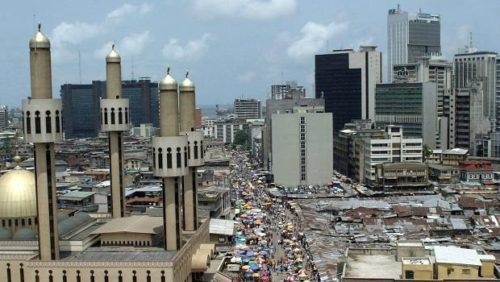
Delta
I am not satisfied with the current state of the economy. Food prices are on a very high side in the market. The salary of a level 1 officer is equal to a bag of rice. Monthly charges for electricity are unbearable. No employment whatsoever. The high price of food is giving a lot of Nigerians a cause for concern. But this is so partly because herdsmen are destroying farms, killing farmers, and destroying their property. As a result, hunger is killing people on the street every day, while some self-centred individuals/politicians keep billions of naira at home and in local and foreign bank accounts.Government officials and lawmakers should stop fooling themselves and playing with our emotions. It is high time we faced the reality about this nation — Nigeria. I’m not blaming President Buhari for making this comment though; he is talking based of what they put in front of him. However, government should be more open and transparent to the people and come up with a good policy that will be good for all. Electricity supply, which will motivate manufactures, is still not stable. The interest rate is still very high and this is making it difficult for Nigerians to do business. Economic situations of individuals in the country are still not good, so government should come up with policies that will stimulate economic growth and get us out of this problem.
Lagos
The economy is still seriously constrained by productivity issues, which have been affecting the performance of businesses across all sectors. The variables that have continued to shape the performance of the economy in the last one year have been infrastructure, policy and institutional environment. There was the issue of commodity prices, an external factor that created shocks in the system. Part of the problem of the last one year has been the quality of policy response to these factors, especially monetary, foreign exchange, tax, investment and trade policies. In the last six months, however, there have been positive changes in the policy environment, which aided the recovery of the economy and impacted on investors’ confidence. We have seen partial improvement in forex management, positive steps taken to improve the ease of doing business and some institutional reforms. All have combined to impact on investors’ confidence. We still have a long way to go, especially in dealing with infrastructure. Unless we fix our infrastructural deficit, it will be difficult to make economic progress.
Ibadan
Having seen what the present Buhari-led government is doing, one shouldn’t find it difficult to submit that Nigeria is gaining economic speed in the wrong direction. Honestly speaking, I haven’t seen what this government has done to make the economy of the country better than what it was in 2015. Fine, everyone keeps praising this government for the anti-corruption moves being made throughout the country to recover the country’s looted treasury but have these moves made us better? The present government has always blamed the immediate past government for the present economic woes of the country. But I would like to ask, Should I blame my parents for my woes in life or should I concentrate on becoming prosperous through resilience and hard work?Nigeria is slightly making economic progress; at least, the exchange rate is somewhat better though it is still annoyingly high. I would like to say that there is economic progress with snail-speed. Although I have read it on the pages of newspapers and heard it on radio that the economy is now better. Yet, I would say that it is better on the paper because the cost of buying things is still very high while wages/salaries remain questionably constant. Besides, many of those who lost their jobs as a result of economic recession haven’t recovered from the loss. What about those whose businesses crashed during that period, the unemployed and the likes? Do they have any hope of surviving the economic heat? One can say confidently that there is economic progress in the country the moment a common man in the street can conveniently live above one dollar (N370) per day.
We certainly have not moved ahead at all. We are still lagging behind in so many areas. I can only acknowledge that we have done well in the areas of regulation and safety of our airspace. Our airspace is safer today than it was before. In the area of regulation, I will rate the industry seven out of 10, and on safety, six and half or seven. Besides these two areas, we have not done much. Our airport infrastructure is still as poor as it was and airline operations are still bellyaching. It is unfortunate but I hope that all the plans the government and the Ministry of Aviation are putting together in terms of concession will come true.We have heard stories of concession and floating of a national carrier in the past but they all came to naught. It remains to be seen the seriousness of the current administration with these two issues. We need these very much if we must revive the aviation industry in the country or the industry will not contribute its fair quota to national growth.We must also give assistance to indigenous airline operators. We can’t leave them to keep suffering. We must also be transparent in the plans towards the concession and the national flag carrier.
Abuja
I believe we have made some progress like in the energy space. We have passed some policies that will ensure we shift the economy away from a strong focus on just oil to focus on gas, the fuel of the future. The Senate is working on getting the Petroleum Industry Governance Bill passed, which will ensure that the Nigerian National Petroleum Corporation is properly restructured. The International Oil Companies are investing in Nigeria again, following the joint venture cash call deal. We haven’t stopped making cash calls but we have put a better structure in place that ensures we don’t build up debts to the IOCs on cash calls. We have made some progress with peace in the Niger Delta. The Maritime University is going ahead and companies operating in the Niger Delta are engaging communities better. However, there are issues we are yet to resolve. Our refineries are still operating below par. In the downstream, we’re yet to fully deregulate the market. The power sector has also made some progress, although less than the oil and gas sector. Our transmission capacity is up to 7,000 megawatts while available generation capacity is about 6,500MW but we lack distribution capacity to take up all the power so we’re unable to do significantly more than 4,500MW at the moment. The power sector privatisation will turn four years by November. But in those four years, we have actually recorded less power generation than before due to various issues, especially the militancy in 2016. But we have more gas supply now but not enough. The distribution needs more radical solution.
Lokoja
Despite what is happening in the economy, the results released by quoted companies on the Nigerian Stock Exchange show that we are gradually getting out of the woods after the recession. Nigeria has a cause to celebrate as things are beginning to look up despite the unease in the economy. So, despite the challenges that have been there, our companies are returning value to their stakeholders. We need to celebrate them and we know that they deserve to be celebrated. Considering the increasing challenges faced by regulators in the Nigerian capital market, the regulators need to ensure and sustain the tempo and also ensure that there is policy consistency. Though the market is gradually getting out of the woods and the bulls have taken over, we want a situation where the positive trend will be sustained so that the returns on investment will be worth the investment made by shareholders. We also want the regulators to ensure consistent education on capital market operations so that confidence can be fully restored. We want them to look at encouraging more local companies to get listed on the Nigerian stock market. They should look at the listing regulations and how these can be streamlined and stepped down so that more companies from the telecoms and oil sectors can be listed. They need to get into the market. I believe that if the regulators do this, the market will be better for it, as it will be deepened and then we can consolidate on the gains.
Lagos
The financial services industry has been going through a recovery process in the past one year. We saw a sector that was in a recession in the earlier part of the year, and later started recovering. The Central Bank of Nigeria took over one of the banks in the period under review. The crisis in the industry has not fully abated. We have seen growth in non-performing loans. But in terms of industry health, the sector is not doing badly. In terms of the general economy, we saw that the economy declined by about 1.4 per cent in the second quarter of 2016, by the second quarter of 2017, the economy had recovered by 0.55 per cent. So, we saw an economy that was in the throes of recession in the second quarter of last year. Twelve months later, it had recovered to positive. But on the average, we have seen an economy that is going through a slow and steady process of recovery in the last 12 calendar months.
Kwara State
No economy progress at all especially in the insurance sector because it has not done well at all and penetration rate has gone really bad. As the population has grown, insurance penetration has not been growing in commensurate proportion.In those days, insurance used to be a major contributor to the economy, but now, it contributes just 0.4 per cent to the Gross Domestic Product. Insurance has not been impacting on lives enough, and the credibility of the sector is not what it should be. The sector has not been able to develop sufficient manpower. The industry needs to learn the language of the people and be able to meet their needs.
Copyright Ships & Ports Ltd. Permission to use quotations from this article is granted subject to appropriate credit given to www.shipsandports.com.ng as the source.

